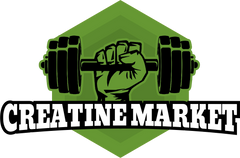If you haven't noticed, create supplements are everywhere. Because of this, selecting the right creatine product can feel overwhelming. With numerous forms, brands, and formulations available, making an informed decision requires understanding key factors that influence supplement quality and effectiveness. This comprehensive guide developed by the great folks at the Creatine Market will help you navigate the selection process and choose the creatine supplement that best aligns with your fitness goals.
Understanding Different Types of Creatine Supplements
Creatine comes in several forms, each with distinct characteristics. Creatine monohydrate stands as the most researched and proven form, with decades of studies supporting its efficacy. This crystalline powder consists of creatine molecules bound to water molecules, creating a stable and highly bioavailable supplement. Here are a few of the more popular types of creatine supplements you'll see when shopping around:
Creatine Monohydrate
Creatine monohydrate represents the gold standard in supplementation. Research consistently demonstrates its effectiveness for increasing muscle mass, strength, and athletic performance. Creatine monohydrate has a molecular structure remains stable during storage, and it offers excellent bioavailability at a reasonable cost.
Creatine HCL
Creatine hydrochloride emerged as a newer formulation claiming enhanced solubility. The addition of hydrochloride purportedly improves absorption and reduces bloating. While some users report fewer digestive issues, research comparing its effectiveness to monohydrate remains limited. Since creatine HCL is relatively new, its lacking updated research.
Buffered Creatine
Manufacturers develop buffered creatine by adding alkaline compounds to potentially improve stability in the stomach. While marketing often promotes enhanced absorption, current research hasn't demonstrated significant advantages of buffered creatine over traditional monohydrate.
Quality Indicators to Consider
When evaluating creatine supplements, several quality indicators deserve attention:
Manufacturing Standards
Look for products manufactured in facilities that follow Good Manufacturing Practices (GMP). These facilities undergo regular inspections and maintain strict quality control protocols. Third-party certifications from organizations like NSF International or Informed Choice provide additional assurance of product quality.
Purity Testing
High-quality supplements undergo regular purity testing to verify creatine content and screen for contaminants. Check product labels or manufacturer websites for information about testing procedures and results. Some companies provide batch-specific testing data accessible through QR codes or lot numbers.
Ingredient Transparency
Reputable manufacturers clearly list all ingredients on their labels. Be wary of proprietary blends that mask individual ingredient amounts. For pure creatine supplements, the ingredient list should be simple and straightforward.
Matching Supplements to Your Goals
Different fitness objectives may influence your choice of creatine supplement:
Strength and Power
For strength athletes and powerlifters, pure creatine monohydrate typically offers the best value. Focus on products with minimal additional ingredients that might interfere with training adaptations.
Muscle Growth
Those pursuing muscle growth should consider creatine's role in their overall supplement strategy. Products that combine creatine with other muscle-building ingredients like leucine or beta-alanine may provide synergistic benefits.
Athletic Performance
Athletes requiring quick energy replenishment might benefit from creatine products formulated with fast-acting carbohydrates. However, verify that any additional ingredients comply with relevant anti-doping regulations.
Form Factor Considerations
The physical form of creatine supplements impacts convenience and compliance:
Powder Supplements
Powder forms offer cost-effectiveness and dosing flexibility. They mix well with various beverages and allow easy adjustment of serving sizes. However, measuring and mixing require additional time and effort.
Capsules and Pills
Capsulated creatine provides convenience for traveling and precise dosing. While typically more expensive per serving than powder, pills eliminate the need for measuring and mixing. Consider capsule size and daily serving requirements when choosing this option.
Ready-to-Drink Products
Pre-mixed creatine beverages offer maximum convenience but often come with higher costs and additional ingredients. These products may prove useful for occasional use but rarely provide the most economical long-term solution.
Budget Considerations
Value assessment extends beyond simple price comparison:
Cost Per Serving
Calculate the cost per serving rather than comparing package prices. Consider the number of servings required during both loading and maintenance phases when evaluating long-term costs.
Bulk Options
Purchasing larger quantities often reduces per-serving costs. However, ensure you can use the product within its shelf life and maintain proper storage conditions.
Common Mistakes to Avoid
Understanding potential pitfalls helps inform better purchasing decisions:
Overlooking Basics
Don't be swayed by marketing claims promoting "revolutionary" formulations. The basic creatine monohydrate remains highly effective and well-researched.
Ignoring Serving Sizes
Compare products based on actual creatine content per serving. Some supplements contain smaller amounts of creatine combined with other ingredients.
Making Your Final Decision
Integration of multiple factors leads to an informed supplement choice:
Begin with your specific goals and preferences regarding form factor. Consider your budget constraints and the importance of convenience in your supplementation routine. Evaluate product quality through manufacturing standards and third-party testing. Finally, compare costs on a per-serving basis to ensure value alignment.
Conclusion
Selecting the optimal creatine supplement requires balancing multiple factors including form, quality, convenience, and cost. While creatine monohydrate remains the most proven and cost-effective option, individual needs and preferences may justify considering alternative formulations. Focus on products from reputable manufacturers that provide transparency about their manufacturing processes and quality control measures. Remember that consistency in supplementation matters more than minor formulation differences, so choose a product that you'll use regularly and systematically.



